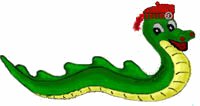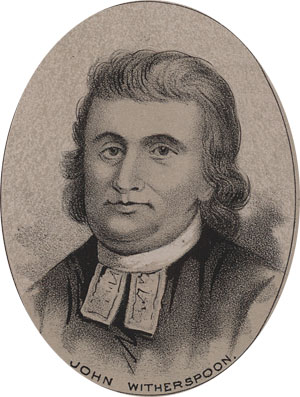 n
Witherspoon
n
Witherspoon
Joh n
Witherspoon
n
Witherspoon
Witherspoon, a clergyman, wrote many a sermon
Against the British
With much resolve and determine.
There is not a single instance in history in which civil liberty was lost, and religious liberty preserved entire. If therefore we yield up our temporal property, we at the same time deliver the conscience into bondage.
John Witherspoon, The Dominion of Providence Over the Passions of Men, 1776
I entreat you in the most earnest manner to believe in Jesus Christ, for there is no salvation in any other [Acts 4:12]. . . . if you are not reconciled to God through Jesus Christ, if you are not clothed with the spotless robe of His righteousness, you must forever perish.
John Witherspoon, The Works of John Witherspoon (Edinburgh: J. Ogle, 1815), Vol. V, pp. 276, 278, The Absolute Necessity of Salvation Through Christ, January 2, 1758.
Many signers studied the ministry as part of their education and many were the sons of clergymen. John Witherspoon was himself a Presbyterian clergyman, the only clergyman to sign the Declaration of Independence.
Born in Scotland as a lineal descendant of John Knox, his father was a well-loved and respected Calvinist minister in the Scottish church. He made sure that his son's early education was based upon sound moral and religious principles and that he was trained for the gospel ministry. John turned out to be very diligent and inclined in interest toward sacred literature. He won master of arts (1739) and divinity (1743) degrees from the University of Edinburgh. Over the next few years, he had acquired a family and became an ordained minister to be widely known for his great piety and learning. He also received an honorary doctorate from St. Andrews in 1764.
He received many invitations to take charge of different churches: at Dublin, in Ireland; Dundee, in Scotland; and Rotterdam, in Holland; but he declined them all. In 1766 by a unanimous vote of the trustees of New Jersey College, he was invited to become its president, but this, too, he declined, largely because his wife Elizabeth desired to remain in their home country.
It was so that in colonial America, the best educated men were often found in the clergy. It was hoped that the College might produce men who would be "ornaments of the State as well as the Church." For its vision, the College of New Jersey believed it needed John Witherspoon to serve as its first president. Through earnest efforts on the part of Richard Stockton and Benjamin Rush, the colonies won him over to accept their offer. From Edinburgh, Benjamin Rush wrote to Witherspoon, "your talents have been in some measure buried, but at Princeton they will be called into action, and the evening of your life will be much more effulgent than your brightest meridian days have been.'' Witherspoon was 44 years of age at the time.
"It reflects no small honor upon Dr. Witherspoon, that he should consent to cross the ocean, and take charge of a college in a new country, leaving behind him a sphere of great respectability, comfort, and usefulness. Having previously declined, it is understood, an urgent invitation to an honorable station in Dublin, in Rotterdam, and in the town of Dundee, in his own country. It deserves also to be mentioned, that a little previous to his embarking for America, and while still in a state of suspense, respecting his duty, an unmarried gentleman of considerable fortune, and a relation of the family, offered to make him his heir, provided he would remain in Scotland." Rev. Charles A. Goodrich Lives of the Signers to the Declaration of Independence. New York: William Reed & Co., 1856.
After only a few days at Princeton, Witherspoon wrote Rush that far too many of the students were inadequately prepared for college work so he would give close attention to the grammar school conducted by the college. He was also worried about the low state of the college's finances.
He worked vigorously toward funding for the college in tours and preaching. In Williamsburg, he "preached to a crowded audience in the Capital yard (there being no house in town capable of holding such a multitude) and gave universal satisfaction." according to the Virginia Gazette. The collection taken at the end of the sermon was "upwards of fifty-six pounds."
The college soon experienced an increased enrollment of students whose tuition was the major source of revenue.
As the College's primary occupation at the time was training ministers, Witherspoon was a major lead
er of the early Presbyterian church in America. Moral Philosophy was a required course, one he considered vital for ministers, lawyers, and those holding positions in government (magistrates). He was firm but good-humored in his leadership and instituted a number of reforms, including modeling the syllabus and university structure on that used at the University of St Andrews and other Scottish universities. He renewed the emphasis upon a well-educated clergy as was the purpose to which the college had been dedicated at the time of its founding.
He saw no conflict between faith and reason; instead, he encouraged his students to test their faith by the rule of experience. He was much inclined to apply the test of common sense to any proposition, and to reduce it to its simplest terms. Though a man of strong convictions, he showed no inclination to protect his students from exposure to ideas with which he disagreed. The many books he added to the library gave the undergraduate access to a wide range of contemporary literature, including authors with whom he had publicly disputed. In his famous lectures on moral philosophy, not published until after his death and then probably contrary to his wish, his method was to lay out contending points of view and to rely upon persuasive reasoning to guide the student toward a proper conclusion of his own.
He subscribed to John Locke's political philosophy and brought from Scotland a strong sense of "British liberty," which he came to see as greatly endangered by the course of British policy. When John Adams stopped over in Princeton on his way to the first meeting of the Continental Congress in 1774, he met Witherspoon and pronounced him "as high a Son of Liberty, as any Man in America."
His sermon The Dominion of Providence over the Passions of Men was published in many editions and he was soon elected to the Continental Congress as part of the New Jersey delegation.
Early in 1776 he was asked to assist in the formation of a new Constitution for New Jersey, and "his patriotic sentiments and sound judgment were there so conspicuous," that he was elected a delegate to the General Congress. Doctor Witherspoon's attendance was strict that it was a very rare thing to find him absent. He spoke often in debate and "took a conspicuous part in both military and financial matters, and his colleagues were astonished at the versatility of his knowledge." The limited-government philosophy of many of our founders was due in large measure to Witherspoon's influence.
Through the years as he served in Congress, Witherspoon's patriotism and judgment won the respect of his colleagues, as evidenced by his assignment to many important committees.
In November 1778, when the British invaded New Jersey, he closed and evacuated the College. The redcoats occupied its major building, destroyed other buildings including the burning of the library. His papers and personal notes were lost. Witherspoon was responsible for its rebuilding after the war, which caused him great personal and financial difficulty. The next year, Witherspoon's son James lost his life at the Battle of Germantown, Pennsylvania. From Wikipedia, the free encyclopedia He resigned from Congress in 1782 when peace seem assured.
"As a theological writer, Doctor Witherspoon had few superiors, and as a statesman he held the first rank. In him were centered the social elements of an upright citizen, a fond parent, a just tutor, and humble Christian; and when, on the tenth of November 1794, at the age of nearly seventy-three years, his useful life closed, it was widely felt that a 'great man had fallen in Israel.'" A later president of the College, who had been one of his students, recalled that Witherspoon had more presence than any man he had known, except for General Washington. B. J. Lossing, Signers of the Declaration of Independence, George F. Cooledge & Brother: New York (1848) [reprinted in Lives of the Signers of the Declaration of Independence, WallBuilder Press: Aledo, Texas (1995)], pages 81-84 W. Frank Craven, Alexander Leitch, A Princeton Companion, copyright Princeton University Press (1978). http://etcweb.princeton.edu/CampusWWW/Companion/witherspoon_john.html
So that we may boldly say, The Lord {is} my helper, and I will not fear what man shall do unto me.
Hebrews 13:6
Image by Ole Erekson,
Engraver, c1876, Library of Congress
A
gentleman told Witherspoon that the country was not yet ripe for independence,
to which Witherspoon replied, "Sir, in my judgment the country is not only ripe,
but rotting."
"Besides his daily devotions of the closet, and the family, it was his stated
practice to observe the last day of every year, with his family, as a day of
fasting, humiliation, and prayer: and it was also his practice to set apart days
for secret fasting and prayer, as occasion suggested."
Rev. Charles A. Goodrich Lives of
the Signers to the Declaration of Independence. New York: William Reed &
Co., 1856
Of John Knox, Mary, queen of Scots, said, "she was more afraid of his prayers, than of an army of ten thousand men."